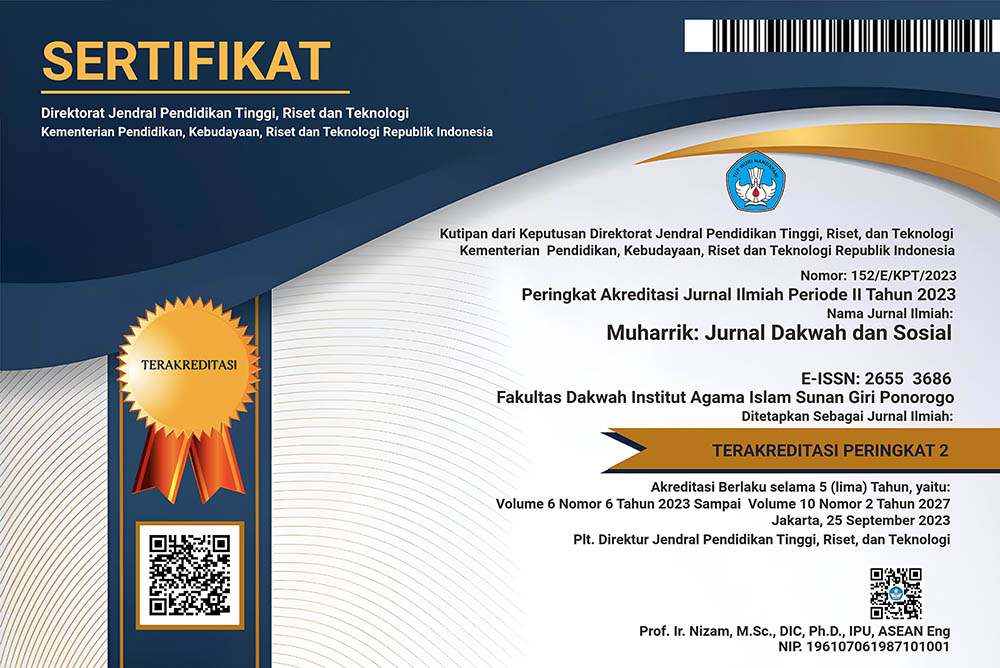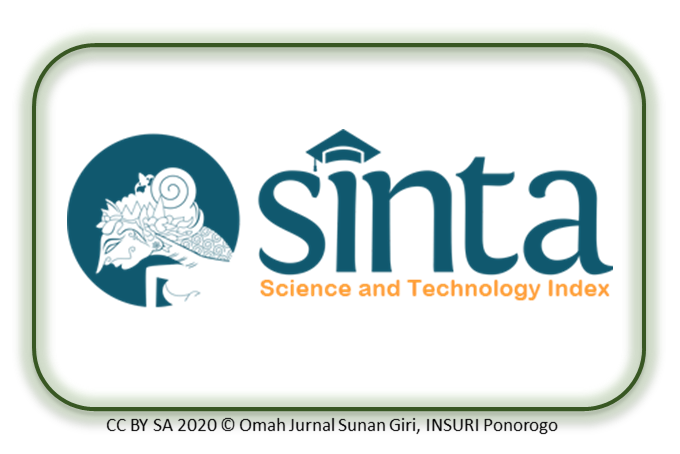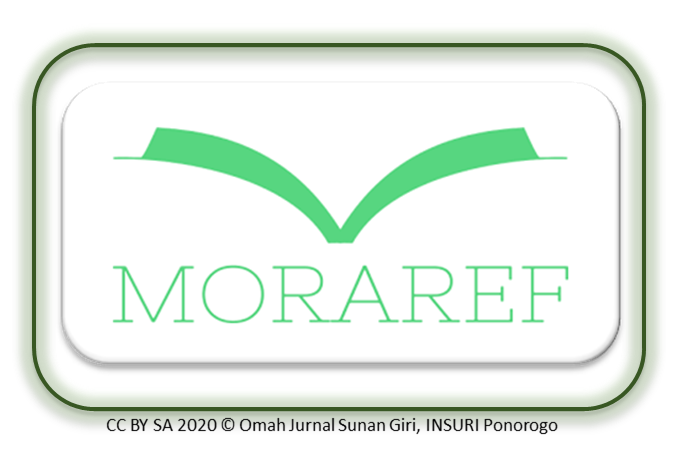Domestic Harmony and Da’wah Values in Mu’asyarah Bil Ma’ruf: An Exegetical Study of Wahbah Zuhaili’s Tafsir al-Munir
Keywords:
Mu'asyarah bil ma'ruf, Tafsir Al-Munir, Domestic Da'wahAbstract
This study is motivated by the phenomenon of domestic quarrels, both in real life and in cyberspace, which often stem from the failure of households to implement the principle of mu’asyarah bil ma’ruf in marital life. Such neglect frequently results in disputes between spouses. The purpose of this research is to explain the implementation of mu’asyarah bil ma’ruf in domestic life according to Wahbah Zuhaili and to analyze its impact on family harmony. Specifically, this paper addresses two main questions: how the concept of mu’asyarah bil ma’ruf is formulated in Wahbah Zuhaili’s Tafsir al-Munir and how its application influences the quality of marital relationships. This research employs a library research design with documentation as the primary method of data collection. The main source is Wahbah Zuhaili’s Tafsir al-Munir, analyzed using a qualitative approach by interpreting textual data and relating it to relevant references for deeper understanding. The findings reveal that mu’asyarah bil ma’ruf is a fundamental obligation of the husband toward his wife, serving as the cornerstone for establishing a family based on sakinah, mawaddah, and rahmah. Without proper fulfillment of rights and obligations, it is impossible for couples to achieve a harmonious and loving household. This research contributes to the field of da’wah and family studies by emphasizing the importance of cultivating a peaceful, compassionate, and morally grounded family environment as the essential foundation for individual and social development.
References
Al-Musayyar, S. A. (2008). Akhlak Al-Usrah Al-Muslimah Buhuts wa Fatawa (Fiqh of Love The Secret of Happiness Rumaah Tangga) (Habiburrahman (ed.)). Erlangga.
Al-Qur’an, T. T. (n.d.). Building a Harmonious Family. Badan R & D dan Diklat Lajnah Pentashihan Mushaf Al-Qur’an.
Arikunto, S. (2002). Prosedur Penelitian (Revisi). Rineka Cipta.
Atmi, S. N. (2020). Interpretation of Verses on Women of Salihah according to Wahbah Zuhaili in Tafsir Al-Munir (Descriptive Studies). UIN Mataram.
Ghozali, A. R. (2003). Fikih Munakahat. Kencana.
Hilmi, I. L. (2021). Mu’asyarah bil Ma’ruf as a Principle of Marriage. Jurnal Ilmiah Ahwal Syakhshiyyah (JAS), 5, 167–186.
Imtihanah, A. H. (2020a). Gender-Friendly Islamic Family Law: Elaboration of Islamic Family Law with the Concept of Mubadalah. Kodificationa, 14.
Imtihanah, A. H. (2020b). Gender-Friendly Islamic Family Law: Elaboration of Islamic Family Law with the Concept of Mubadalah. Journal of Codification, 14.
Lisnawati. (2017). The Relevance of the Principle of Mu’asyarah Bil-Ma’ruf to the Articles of the Law on the Elimination of Domestic Violenc. IAIN Palangka Raya.
Mufid, M. (2015). Learning from Three Sham Ulama. PT Elex Media Komputindo.
Muhammad, H. (2020). Women’s Fiqh (3rd ed.). IRCiSoD.
Munawarotulhuda, M. (2020). The Concept of Mu’asyarah Bi Al-Ma’ruf According to Pndangan Buya Hamka (d.1981 AD) and Shaykh Mutawalli Ash-Sya’rawi (d.1998 AD) Jakarta ). IIQ Jakarta.
Nashruddin Baidan, E. A. (2015). Special Methodology of Tafsir Research. IAIN Surakarta.
Neli, J. (2017). Analysis of Family Income Obligations in the Implementation of Common Property. Al-Istinbath Journal, Vol. 2, Nu.
Rohmah, S. (2005). The Concept of Mu’asyarah bi Al-Ma’ruf in the Family (A Critical Study of Masdar Farid Mas’udi’s Thought). UIN Sunan Kalijaga, Yogyakarta.
Sasmita, D. (2014). Juridical Review of the Treatment of Husbands towards Wives during Nusyuz Based on Islamic Law. Jember University, Jember.
Shihab, M. Q. (2002). Tafsir Al-Misbah Message, Impression, and Harmony of the Qur’an Volume 3. Lentera Hati.
Sitorus, R. A. (2017). Husband’s Obligation to Wife (Case Study of TKW in Sijabuti Teratai Village, Air Batu District. UIN North Sumatra, North Sumatra.
Sukron, M. (2018). Tafsir Wahbah Al-Z Uhaili Analisis Pendekatan, Metodologi, Dan Corak Tafsir Al-Munir Terhadap Ayat Poligami. TAJDID: Jurnal Pemikiran Keislaman Dan Kemanusiaan, 2(1), 261–274. https://doi.org/10.52266/tadjid.v2i1.100
Thaimi, S. S. (2014). Fikih Munakahat Kajian Fikih Nikah Lengkap. Rajawali Pers.
Yunus, M. (2010). Arabic-Indonesian Dictionary. PT Mahmud Yunus Wa Dzurriyyah.
Zuhaili, W. (2011). Islamic Fiqh Wa Adillatuhu ( et al tr. Abdul Hayie Al-Kattani (ed.); 1st ed.). Gema Insani.
Zuhaili, W. (2012). Tafsir Al-Wasith (1st ed.). Gema Insani.
Zuhaili, W. (2013). Tafsir Al-Munir Aqidah, Sharia, Manhaj (A. H. Al-Kattani (ed.); 3rd ed.). Gema Insani.
Downloads
Published
Issue
Section
License
Copyright (c) 2024 Lalu Muhamad Fazlurrahman

This work is licensed under a Creative Commons Attribution-NonCommercial 4.0 International License.
The author(s) retain/s the copyright and grant/s Muharrik: Jurnal Dakwah dan Sosial the first publication rights licensed under the Creative Commons Attribution-NonCommercial 4.0 International (CC BY-NC 4.0) , which allows others to access (search, read, download and quote), share (copy and redistribute the material in any media or format) and adapt (mix, modify and develop) works for legitimate non-commercial purposes, with recognition of the authorship of the work and its initial publication in this journal.












